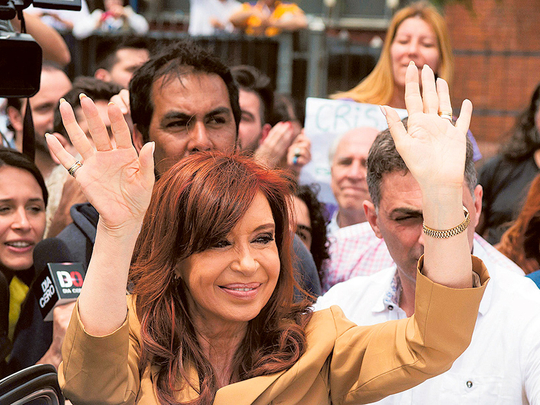
Buenos Aires: Former Argentine president Cristina Kirchner was charged in a corruption case Tuesday and slapped with a $630 million (Dh2.3 billion) asset freeze over public tenders awarded to a businessman friend during her administration.
Kirchner, who was in office from 2007 to 2015, was charged with illicit association and fraudulent administration for allegedly favouring construction magnate Lazaro Baez for public contracts in Patagonia, her southern political bastion.
The former president, who has repeatedly denied any wrongdoing, has blasted the accusations as “a big manoeuvre of political persecution”.
It is the latest legal trouble for a generation of leftist leaders who dominated Latin American politics until recently.
Kirchner, 63, joins Brazil’s former presidents Luiz Inacio Lula da Silva and Dilma Rousseff on a list of so-called “pink tide” leaders facing corruption charges or allegations of abusing power.
It is the second set of charges brought against her this year.
In November, an appeals court upheld a decision to charge her with damaging the national finances during her time in office.
In that case, she is accused of ordering the central bank to sell dollar futures at artificially low prices near the end of her term, causing Argentina to lose hundreds of millions of dollars.
She had already been hit with a $1 million asset freeze in that case.
The latest decision goes much further.
Judge Julian Ercolini ordered “an embargo on her assets of 10 billion pesos (Dh42 billion),” according to a justice ministry statement.
Also charged were Baez; Kirchner’s planning minister at the time of the tenders, Julio de Vido; and former deputy public works minister Jose Lopez.
Lopez shot to infamy in Argentina in June when he was caught trying to hide 160 bags stuffed with more than $9 million in cash in a monastery garden.
Baez, the owner of the Austral group conglomerate, has been in jail since April. He was close to Kirchner and her late husband Nestor, who preceded her as president from 2003 to 2007.
Baez’s fortune grew considerably during the Kirchners’ three terms.
Prosecutors say his company won $2.2 billion worth of public contracts in Santa Cruz province during Kirchner’s administration — 78 per cent of all public tenders for the province.
During preliminary hearings, Kirchner downplayed her ties to the businessman, saying, “I am neither a friend nor an associate of Baez.”
She calls the cases against her a political plot by her successor, centre-right President Mauricio Macri.
Macri swept to power just over a year ago with promises to revive Latin America’s third-largest economy with market-friendly reforms after 12 years of leftist rule under which the country went from economic boom to bust.
The promised growth has yet to arrive, however.
Seven in 10 Argentines are worried about the economy, according to a recent poll, and an equal number think Macri “governs for the rich.”
The combative Kirchner has sought to leverage that in her favour, convening supporters for large protests outside her court appearances.
Like Lula and Rousseff in neighbouring Brazil, she accuses her opponents of trying to sideline her from the political scene.
Lula, who left office in 2011 with popularity ratings over 90 per cent, now faces charges in a massive, multi-billion-dollar corruption scheme centred on the state oil company Petrobras.
Rousseff, his hand-picked successor, was impeached in August over accusations she fudged the government’s accounts to hide the depth of a recession and improve her chances at re-election.
She was replaced by centre-right President Michel Temer, whose government has now also been tainted by the Petrobras scandal.












